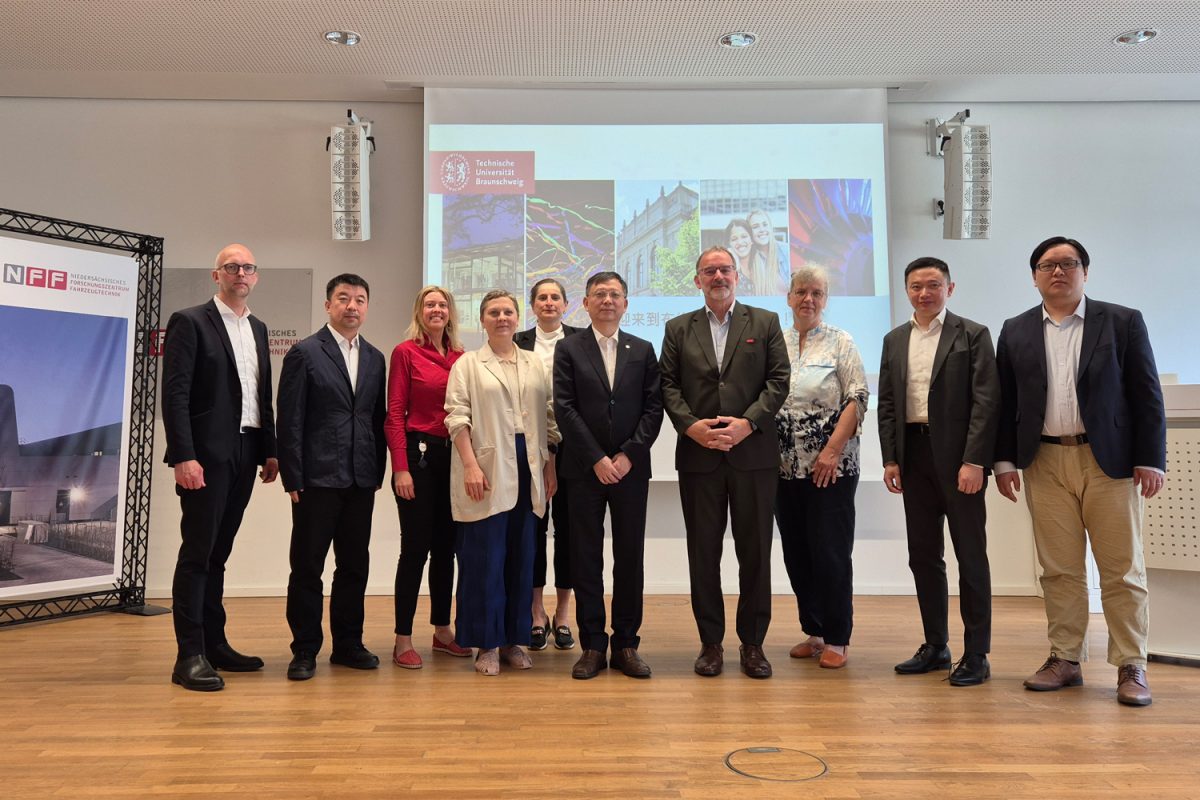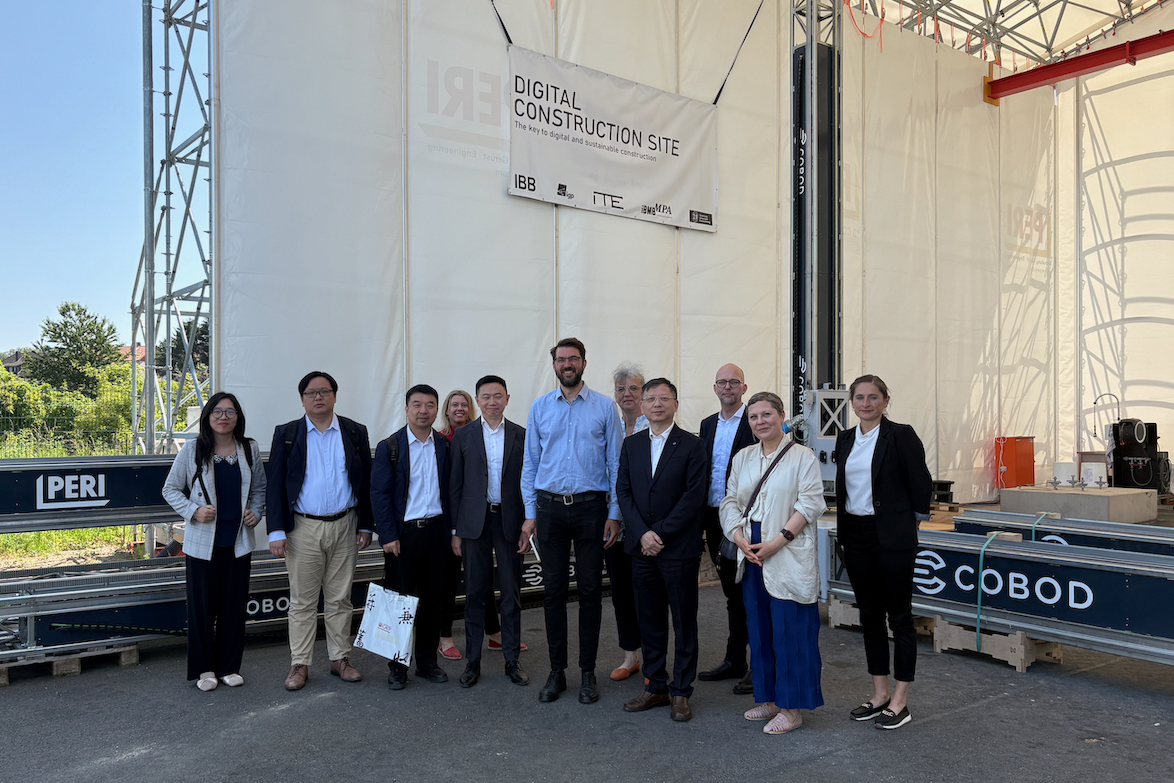Delegation from Tongji University visits TU Braunschweig New impetus for the long-standing partnership
A high-ranking delegation from Tongji University Shanghai, led by Professor Shouen Fang, Chairman of the University Council, visited TU Braunschweig in mid-June. The two universities are linked by a 40-year partnership. The joint exchange focussed on impulses for deepening and expanding cooperation in teaching and research.
On behalf of the Executive Board of TU Braunschweig, Professor Manfred Krafczyk, Vice President for Digitalisation and Sustainability, welcomed the delegation together with Professor Vanessa Miriam Carlow, spokesperson for the Future City core research area and Vice Director of the Chinese-German Centre for Research and Development of Sustainable Cities (CDZNS), which was founded in 2023 together with the College of Architecture and Urban Planning (CAUP) at Tongji University. The delegation was warmly welcomed at the Automotive Research Centre Niedersachsen (NFF) by Managing Director Nadine Pieper.

The delegation from Tongji University was welcomed at the NFF. From right to left: Prof Liming Cai, Wen Yin, Dr Ute Kopka, Prof Manfred Krafczyk, Prof Shouen Fang, Dr Anna Lux, Prof Vanessa Miriam Carlow, Nadine Pieper, Prof Zhendong Wang, Olaf Mumm. Picture credits: NFF/TU Braunschweig
In his keynote speech, Professor Shouen Fang emphasised that TU Braunschweig is one of his university’s closest partner universities and that the mutual exchange of students and doctoral candidates should continue to play a central role in the development of the strategic framework conditions of the partnership in the future. This was emphasised by the other members of the delegation, including Professor Zhendong Wang (Chairman of the University Council of the College for Architecture and Urban Planning (CAUP), Wen Yin (Director of the International Office), Professor Liming Cai (Vice Director of the Chinese-German University College, CDHK), and Jiwen Su (Chinese-German University CDH).
“We feel very honoured by the close relationship with Tongji University and would like to remain one of its closest partners in the future. That’s why we want to further intensify the exchange in research and teaching and drive forward innovative projects together,” explained TU Vice President Professor Manfred Krafczyk.
Tackling new global challenges together
The talks, which were also attended by Dr Anna Lux, Managing Director of the ” Future City ” core research area, Dr Ute Kopka from the International House Mobility Office and Olaf Mumm, Deputy Director of the ISU – Institute for Sustainable Urbanism, explored mutual potential and provided new impetus for further cooperation, particularly in the areas of architecture, sustainable urban planning and vehicle technology. The dialogue also focused on new global challenges – such as the role of artificial intelligence and its far-reaching impact on universities, research and academic education.
Professor Carlow emphasised the importance of scientific dialogue, which is reflected both in joint research projects such as the Urban Climate Future Lab and in doctoral student exchanges in the fields of digital building fabrication, health architecture and sustainable urban development. “In architecture and sustainable urban development, societies often face very similar challenges. As partners in research and teaching, we can learn a lot from each other in terms of the co-evolution of ideas, methods and concepts, despite all the differences.”
Representing Professor Thomas Vietor, Vice Director of the Chinese-German Centre for Automotive Research and Development (CDZA) and subject coordinator for automotive engineering at the Chinese-German University College (CDHK), Nadine Pieper further explained thematic points of contact in the field of mobility research. In particular, she highlighted the potential of the so-called “Mobility Alley” at the research airport, to which the NFF also contributes as an interdisciplinary research centre.
The delegation gained specific insights into research topics and infrastructures in Braunschweig during a tour of the NFF technology centre. The focus was on topics such as automated and autonomous driving, electromobility and fuel cell technologies. The guests then visited the Digital Building Fabrication Laboratory (DBFL), where Professor Norman Hack presented the Collaborative Research Centre “Additive Manufacturing in Construction” (TRR 277). The delegation was impressed by the “digital construction site”, which is about to be officially opened.
40 years of university partnership
TU Braunschweig and Tongji University have been cooperating with each other for four decades. Since the first framework agreement was signed in 1985, the two universities have gradually forged closer links. At the end of the 1990s, Tongji doctoral students came to the Institute of Machine Tools and Production Engineering at TU Braunschweig for the first time. Since 2004, TU Braunschweig has been a member of the Chinese-German University College (CDHK) under the leadership of Professor Thomas Vietor. There are also student exchanges in the Departments of Mechanical Engineering and Architecture, among others. Since 2010, architecture students, for example, have been able to go to Tongji University for their compulsory year abroad as part of the Bachelor Plus programme. Another milestone followed in 2010 with the introduction of a joint double Master’s programme in Mechanical Engineering and Automotive Engineering. Large interdisciplinary and transdisciplinary collaborative projects such as the BMBF-funded project EAST Cities – Establishing and Achieving Sustainable Cities under the leadership of Professor Carlow and Professor Nannan Dong (CAUP) were also initiated, linking the research focus areas of mobility and the city of the future. In 2018, a TU Braunschweig liaison office was opened on the campus of Tongji University. The cooperation has also continued during the coronavirus pandemic – for example in joint digital courses.

